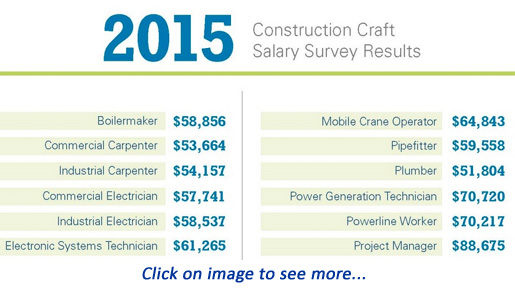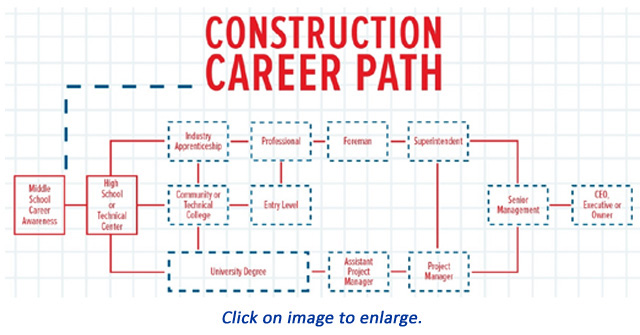Construction is More Than High Salaries [1]
 [9]The following was originally published on the NCCER blog Breaking Ground [10]. Reprinted with permission.
[9]The following was originally published on the NCCER blog Breaking Ground [10]. Reprinted with permission.
There’s no better time to work in the construction industry than now. With a growing skilled workforce shortage, salaries remain high and career opportunities are plentiful. Earlier this year, NCCER [11] released its annual Construction Craft Salary Survey, which lists the average annual salaries of craft professionals from industrial and commercial construction firms across the country.
For as high as these salaries are, the reality is that what skilled craft professionals earn is typically far greater. The salaries listed in NCCER’s survey are average base salaries, not including overtime, per diem, bonuses or other incentives. Construction is known for having plenty of overtime and travel opportunities as well as bonuses. Not to mention, many contractors also have incentives in which they pay for employee training, vacation time, retirement plans, cell phones, vehicle allowances and/or per diem or housing depending on the length of a project.
Not many industries offer the high salaries, incentives or growth opportunities that construction does. While many craft professionals can earn well over six digits, it is important to remember that project location, company size, construction type, credentials, certifications and experience are some of the factors that determine a skilled professional’s salary. According to the responses for NCCER’s survey, here are the ranges for the highest earning professions:
| CRAFT | Lowest Salary | Highest Salary |
|---|---|---|
| Project Manager | $34,000 | $226,700 |
| Project Supervisor | $30,000 | $225,000 |
| Heavy Equipment Operator | $33,280 | $137,280 |
| Carpenter: Commercial | $24,960 | $135,200 |
| Electrician: Commercial | $37,440 | $122,720 |
| Tower Crane Operator | $57,533 | $114,400 |
| Welder: Pipe | $35,360 | $108,160 |
These salaries show the earning potential that construction offers individuals with or without a college degree. Construction is one of the few industries where individuals can earn while they learn through industry training programs or at local community or career colleges. Regardless of where a person starts, there’s no limit to where he or she can go in the construction industry. From craft professional to CEO, a construction career path offers plenty of opportunities for anyone willing to put in the effort. [12]
[12]
While the skilled crafts offer high paying salaries and opportunities for career development, many individuals choose to stay in school to become architects or engineers. Like the crafts, both of these careers also pay well and offer career advancement. According to the Bureau of Labor Statistics, the average annual salaries in 2015 for design team professionals with graduate degrees range from $82,850 for architects to $97,340 for electrical engineers, with civil engineers earning $87,940 and mechanical engineers earning $88,190. However, because these careers require graduate degrees and licensure, it can take architects and engineers much longer to earn high paying salaries compared to skilled craft professionals who can start their careers directly out of high school and without college debt. As a result, skilled craft professionals have the opportunity to earn a higher net cumulative income over the course of a career.
In construction, individuals can enter the industry straight out of high school and start earning a salary. From there, they can develop their skills and take advantage of endless opportunities with huge earning potential. There’s no better way to earn a living if you ask me!

